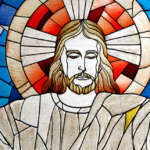Leadership at a time of chaos
I’m half way through my programme of deanery visits which began in November. Each day begins with a Eucharist with the clergy and on every visit so far I’ve offered a reflection on the first verse of the Bible on the theme of leadership in chaos. At this mid point it seems right to move on to a different message – but here is the text for those who may find it helpful
In the beginning God created the heaven and the earth. And the earth was without form and void: and darkness was upon the face of the deep. And the Spirit of God moved upon the face of the waters (Gen 1.1)
Most situations of ministry and leadership we encounter in our lives are predictable and well ordered. We appeal to precedent and patterns. The Anglican tradition is deeply rooted in the Benedictine tradition with its stress on stability and order. We love to do at this time of year more or less what we did last year. We love the natural seasons and rhythms of the year and the seasons of the liturgical year. We lean back into the patterns and shapes which give meaning to our lives in regular time.
Every so often in our lives we will experience a step in our individual or our lives ministry which disrupts all of that pattern and order for a time and then things will go “back to normal”. Many of us will have experienced this in vocational junctions and in transitions between posts. Becoming an incumbent for the first time can be disorientating as can the step into retirement. Ministering in a local crisis in a parish can throw everything awry. So can illness in ourselves or our family, or bereavement or any number of crises.
But over the last two years or so we have experienced a massive disruption not just to our own ministries but to the whole world and the whole life of the Church. The disruption of COVID has been followed by the terrible war in Ukraine which feels very close to home and by the steepest increase in the cost of living for a generation. The foundations have been shaken. We have not yet taken in the depth and extent of the effect of COVID on all of our lives and on our churches. Where are we to go for inspiration for how to lead in such a time as this?
Genesis 1 has long seemed to me to be a text on leadership and a particular kind of leadership: leadership in chaos.
According to Old Testament scholarship, the text originated in the time of the exile. It that context it is a remarkable statement of faith. The vivid and terrible pictures we have seen of Ukrainians leaving their homes for an unknown future remind us of the suffering of the people of Jerusalem six hundred years before the birth of Christ. Jerusalem and the Temple were destroyed by the armies of Babylon. Many of those who survived the terrible siege were taken into captivity in what is now Iraq. Psalm 137 gives us still a taste of all that they endured.
The exile asked hard questions of faith in a time of chaos and those questions needed to be answered. What did all this suffering mean for the people of God? Were the idols in the mighty temples in Babylon really stronger than the God of Israel?
We find part of the response in Genesis 1: a calm and ordered account of the creation of the universe by the God of Israel. But note where that account begins: not with nothing at all but with chaos.
At the beginning, says Genesis, the earth is without form and void. The Hebrew terms is beautifully onomatopoeic (you have to say it several times aloud to get the sense): tohu wa bohu. Everything is darkness and water. Remember that the sea is the great symbol of chaos and death throughout the Ancient Near East.
What is happening in the midsts of chaos? The Spirit of God is brooding over the face of the waters. Then God creates by Word and Spirit. The pattern of creation is that God orders and divides and separates and brings great beauty and life culminating in the creation of humanity and of the sabbath.
There are lessons for us here. Part of our role at this time is to help bring a new order out of chaos and disruption not only in the church but in the communities we serve. We are only probably only part way through the chaos of the pandemic as we all know. It’s been heart stretching to listen to the different accounts of all that our churches have done and of the cost to so many.
We need to acknowledge the crises in many professions because of the additional demands in health and social care; in our schools and in many other walks of life. But there is a deep weariness among our clergy and lay ministers and church officers. Over the first six months of this series of visits, I’ve observed a number of changes in morale over time.
In November, the two words I heard most were weariness and hope in more or less equal proportions. In December hope was deferred with the arrival of the omicron variant and the cancellation of many Christmas services. In January and early February, there was a sense that many were at the limit of their resources. In March and April, hope and energy have been returning but the challenges remain.
One image from the conversations stands out. Many clergy have used the image of beginning the pandemic as if it was a sprint and then discovering it was in fact a marathon. But one person said to me that even this did not do justice to how its felt: a better image was imagining you have had to learn every discipline of the modern pentathlon from scratch and to Olympic standards and then go on and train for the next one.
I am in awe and deep appreciation for what the clergy and lay ministers and church officers of the diocese have achieved through these last two years. Thank you. You have done magnificently. Many come to this point and feel they have not fallen short in some way (and all of us have been stretched beyond ourselves). But from my perspective this is not the case. The depth of pastoral care, outreach into the community, mastering new skills and gently steering communities through new challenges has been extraordinary.
But as we reflect together on how best to lead at this moment, in the evolving chaos of the world, may I draw all of our attention to three themes in Genesis 1. The first is that of brooding: the Spirit of God broods over the face of the waters. The word to brood is genuinely the word used of a hen on her nest, waiting for her eggs to hatch. The word carries two meanings in combination: there is first a hopeful, patient and expectant waiting for new life and something new to emerge. The second is loving care. That seems to me to be a good model for ministry at the present time.
There are very few consistent patterns as yet. There are different needs in different places. Different sections of our society and different communities have been affected in many different ways. There are still unexpected events and wrong turnings. How are you brooding and taking time to reflect on what is needed in this time? All of us will need more of that kind of time not less in this season. We need to free ourselves from our own and others expectations in terms of what we should be doing and achieving and looking honestly at how things are unfolding.
I found in myself once it was possible to be out and about again in the final months of last year a great temptation to put too much into the diary. When I looked within I found two strong motivations: the first was to get everything back to normal as swiftly as possible. The second was somehow to make up for lost time. Both I think were misguided.
The second theme from the passage is to pay attention to the wise ordering of time. This is a major theme in Genesis 1 as you will know. Even God does not do all of the work of creation in a single day. We all know the refrain which runs through the passage: there is evening and there is morning, the first day. Eugene Peterson draws attention very helpfully to the Hebrew concept of time which begins in the evening, not with work but with rest. For the first part of every 24 hours, we rest and sleep: the world is on God’s shoulders not ours. We then rise in the morning to join in what God is already doing for the work of that day and lay it down again in the evening.
The ordering of our time is likely to be a key factor in this next part of the journey. None of us have been this way before. None of knows exactly how to do this. We are all learning new patterns and responsibilities. We will need to sit lightly to them and exercise patience. We will need to lean back again not into our old patterns and rhythms but to the Benedictine principles which lie beneath them: of balancing continually the three priorities of prayer and rest and work into a sustainable new pattern of life and ministry.
My third theme of reflection is on sabbath. It’s remarkable to reflect that the high point of the creation story, as told by the exiles in Babylon, is not the creation of humankind on the sixth day. The highpoint of the story is the profound creation of the sabbath, the hallowing of the seventh day. At this point in our story, as we navigate the various crises facing humanity, we will need to remember in profound ways what it means to be human.
What makes us truly human, according to the creation story of Genesis, is the ability to share in the sabbath: the ability to rest, to reflect, to enjoy God and God’s creation which sets us apart from the rest of the created world. Sabbath means far more than giving ourselves permission to rediscover regular days off and holidays (important though these are). Sabbath is part of our essential identity as human beings: we are created for more than work. We are created to share in communion with God, Father, Son and Spirit, in delighting in creation, in people, in one another and in God’s Church. In that resting, recreation and delight we find the strength to continue to offer leadership and ministry in chaos.
In the beginning God created the heaven and the earth. And the earth was without form and void: and darkness was upon the face of the deep. And the Spirit of God moved upon the face of the waters (Gen 1.1).


